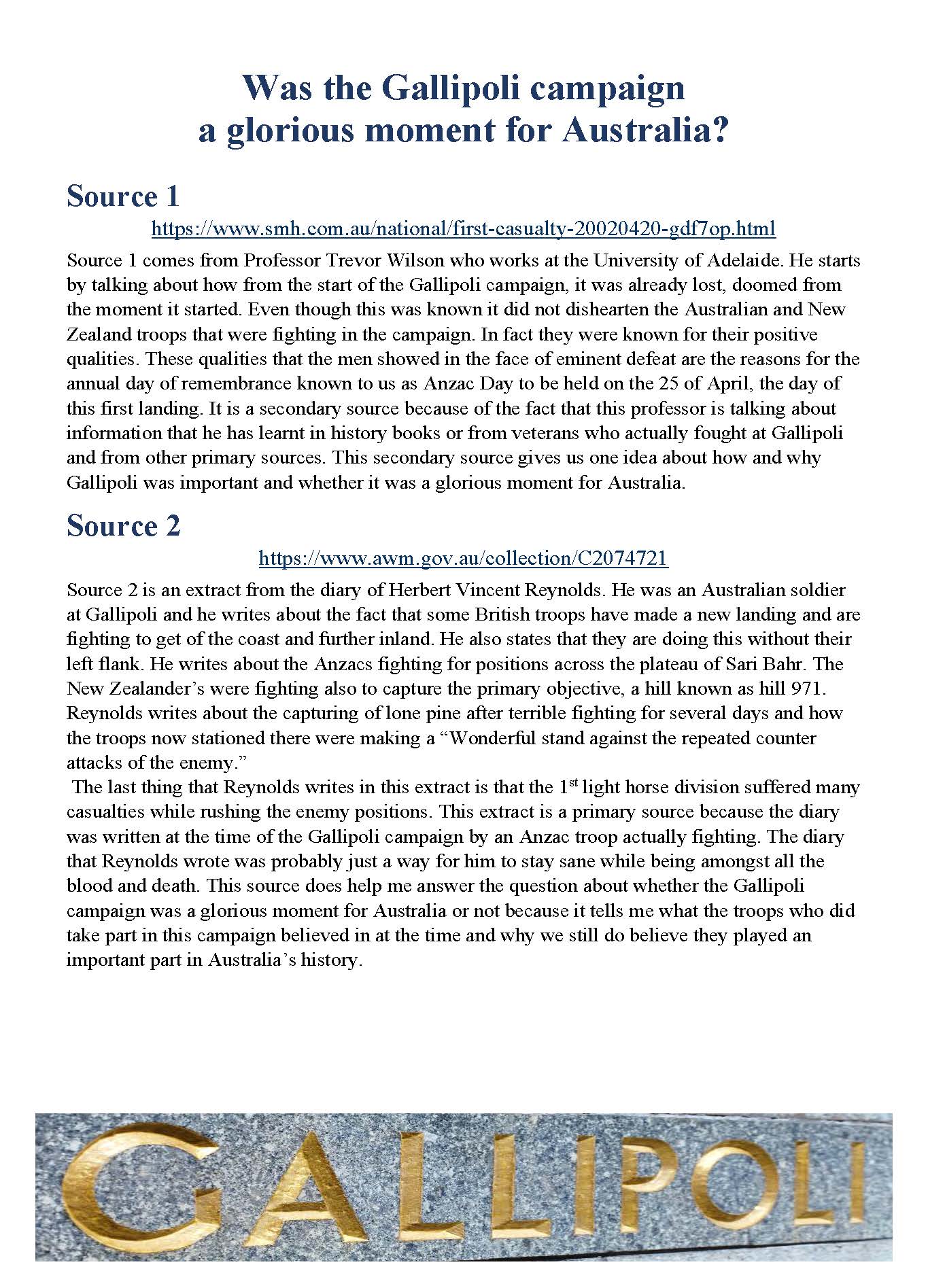- Home
- Resources
- Work samples
- Samples
- Source analysis: The Gallipoli campaign - Above
History
Year 9
Above satisfactory
Source analysis: The Gallipoli campaign
 1
Annotation 1
1
Annotation 1
Identifies the nature of a source 2 Annotation 2
Identifies the perspective of a source 3 Annotation 3
Identifies the usefulness of a source 4 Annotation 4
Identifies the purpose of a source 5 Annotation 5
Uses multiple sources to develop a complex interpretation of a historical event
-
Annotations
-
1
Annotation 1
Identifies the nature of a source -
2
Annotation 2
Identifies the perspective of a source -
3
Annotation 3
Identifies the usefulness of a source -
4
Annotation 4
Identifies the purpose of a source -
5
Annotation 5
Uses multiple sources to develop a complex interpretation of a historical event
 1
Annotation 1
1
Annotation 1
Uses direct quotation from a source to support an interpretation of a historical event 2 Annotation 2
Presents an analysis of an event using a well-structured and detailed written text 3 Annotation 3
Recognises differences between sources 4 Annotation 4
Describes the usefulness of a source 5 Annotation 5
Analyses in detail the perspective provided by the source
-
Annotations
-
1
Annotation 1
Uses direct quotation from a source to support an interpretation of a historical event -
2
Annotation 2
Presents an analysis of an event using a well-structured and detailed written text -
3
Annotation 3
Recognises differences between sources -
4
Annotation 4
Describes the usefulness of a source -
5
Annotation 5
Analyses in detail the perspective provided by the source
 1
Annotation 1
1
Annotation 1
Reflects on the particular perspective provided by a source 2 Annotation 2
Uses direct quotation from a source to support an interpretation of a historical event 3 Annotation 3
Uses multiple sources to develop a complex interpretation of a historical event
-
Annotations
-
1
Annotation 1
Reflects on the particular perspective provided by a source -
2
Annotation 2
Uses direct quotation from a source to support an interpretation of a historical event -
3
Annotation 3
Uses multiple sources to develop a complex interpretation of a historical event
Satisfactory
Source analysis: The Gallipoli campaign
 1
Annotation 1
1
Annotation 1
Identifies the origin of a source 2 Annotation 2
Summarises the content of a source 3 Annotation 3
Identifies the nature and usefulness of a source 4 Annotation 4
Uses direct quotation from a source to support an interpretation 5 Annotation 5
Analyses the perspective provided by a source
-
Annotations
-
1
Annotation 1
Identifies the origin of a source -
2
Annotation 2
Summarises the content of a source -
3
Annotation 3
Identifies the nature and usefulness of a source -
4
Annotation 4
Uses direct quotation from a source to support an interpretation -
5
Annotation 5
Analyses the perspective provided by a source
 1
Annotation 1
1
Annotation 1
Identifies the origin and nature of a source 2 Annotation 2
Summarises the content of a source 3 Annotation 3
Analyses the usefulness of a source 4 Annotation 4
Uses direct quotation from a source to support an interpretation 5 Annotation 5
Considers multiple sources to draw a simple conclusion about the significance of a historical event
-
Annotations
-
1
Annotation 1
Identifies the origin and nature of a source -
2
Annotation 2
Summarises the content of a source -
3
Annotation 3
Analyses the usefulness of a source -
4
Annotation 4
Uses direct quotation from a source to support an interpretation -
5
Annotation 5
Considers multiple sources to draw a simple conclusion about the significance of a historical event
Above satisfactory
Source analysis: The Gallipoli campaign
 1
Annotation 1
1
Annotation 1
Identifies the nature of a source 2 Annotation 2
Identifies the perspective of a source 3 Annotation 3
Identifies the usefulness of a source 4 Annotation 4
Identifies the purpose of a source 5 Annotation 5
Uses multiple sources to develop a complex interpretation of a historical event
-
Annotations
-
1
Annotation 1
Identifies the nature of a source -
2
Annotation 2
Identifies the perspective of a source -
3
Annotation 3
Identifies the usefulness of a source -
4
Annotation 4
Identifies the purpose of a source -
5
Annotation 5
Uses multiple sources to develop a complex interpretation of a historical event
 1
Annotation 1
1
Annotation 1
Uses direct quotation from a source to support an interpretation of a historical event 2 Annotation 2
Presents an analysis of an event using a well-structured and detailed written text 3 Annotation 3
Recognises differences between sources 4 Annotation 4
Describes the usefulness of a source 5 Annotation 5
Analyses in detail the perspective provided by the source
-
Annotations
-
1
Annotation 1
Uses direct quotation from a source to support an interpretation of a historical event -
2
Annotation 2
Presents an analysis of an event using a well-structured and detailed written text -
3
Annotation 3
Recognises differences between sources -
4
Annotation 4
Describes the usefulness of a source -
5
Annotation 5
Analyses in detail the perspective provided by the source
 1
Annotation 1
1
Annotation 1
Reflects on the particular perspective provided by a source 2 Annotation 2
Uses direct quotation from a source to support an interpretation of a historical event 3 Annotation 3
Uses multiple sources to develop a complex interpretation of a historical event
-
Annotations
-
1
Annotation 1
Reflects on the particular perspective provided by a source -
2
Annotation 2
Uses direct quotation from a source to support an interpretation of a historical event -
3
Annotation 3
Uses multiple sources to develop a complex interpretation of a historical event